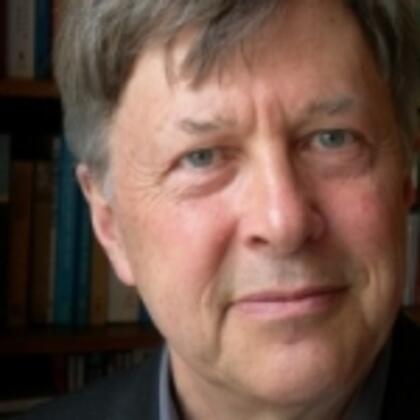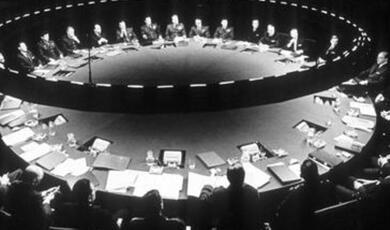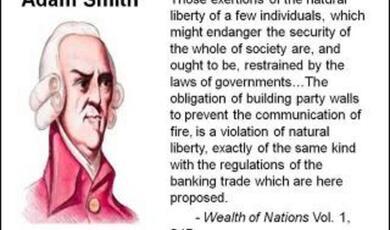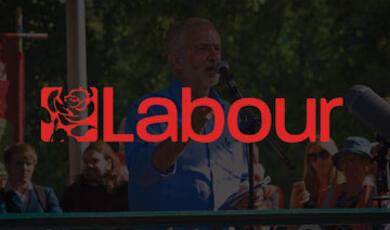Tearing up the ideological maps, and squabbling over the compass
Share
- Details
- Text
- Audio
- Downloads
- Extra Reading
Political ideas in Britain at the start of the twenty-first century. The deaths of socialism and conservatism? Prophecies and predictions about the end of history or a clash of civilisations? New issues in political ideology: identity, culture, religion. The search for new ways forward. What, if anything, can we predict?
Download Text
TEARING UP THE IDEOLOGICAL MAPS, AND SQUABBLING OVER THE COMPASS
Professor Rodney Barker
Political ideas in Britain at the start of the twenty-first century. The deaths of socialism and conservatism? Prophecies and predictions about the end of history or a clash of civilisations? New issues in political ideology: identity, culture, religion. The search for new ways forward. What, if anything, can we predict?
_____________________________________________________________________
1*PICTURE
1. The End of Short Twentieth Century - What is it that is ending?
The end of the short twentieth century in 1989:
End of the Cold War
End of East West
End of left/right ideological map
Tearing down the walls
2*PICTURE
It wasn't just walls that were disappearing.
Ideologies were evaporating and vanishing as well
The end of the short twentieth century seemed also to mark the end of socialism and conservatism, or at the very least the end of the ideologies which had enjoyed those titles.
Not that they disappeared completely from the language of political argument and ideology, but they were no longer the principal actors, and if a Martian had arrived in 1990 and was constructing words and titles from scratch to describe what was most prominent in British political ideology, she would not have needed to invent the words 'socialism' or 'conservatism'
The basic assumptions and conditions within which socialism and conservatism had flourished as ideologies, had changed
3*PICTURE
Socialism had involved:
1. Class politics
2. Common or at least collective provision of the essential services, resources, and facilities for living: health, education, transport, energy
3. Political rather than market means of allocating and managing those services
All of these conditions had disappeared, changed, or faded by the end of the short 20th
{1.} Class politics: Class was no longer the major category that it had been in 20th century politics, and there were other, and varied markers of social grouping and identity: region, culture, religion, ethnicity.
The Nuffield Election study of the 1950 General Election contained for the first time a study of national swing. The Nuffield study of the 2005 general election contained an appendix which pointed out the erosion of any simple national pattern
Fragmentation of the electorate, so that when studies were made of the elections of 1997, 2001, or 2005, apart from the fact that with the 21stcentury, voter turnout was very low, it was no longer easy to talk of voting in terms of broad national patterns arranged principally along lines of class. There were strong regional variations, whilst in some areas religious affiliation, to Islam in some places, to Roman Catholicism or Protestantism in Northern Ireland, was more significant than class.
In the 2005 General Election, for instance, there were two kinds of constituencies where the Labour vote was significantly more eroded than elsewhere: those with large student populations, and those with large Muslim populations. The first group were alienated over the introduction of top up fees, the second by the invasion of Iraq. In each case a policy issue which was not principally related to class was the clinching factor, and in each case the crucial group was not a class but either an occupational or a religious cultural one.
{2.} Common provision: The uniformity of need which was assumed or implied in the idea of collective provision of services was being increasingly attacked and questioned. Whether or not one size fitted all, it was no longer so obvious, or at least so accepted, that one person or group or institution could decide what that size was
{3.} Politics not markets: The idea that decisions about the allocation of resources had to be the result of political discussion and negotiation came to seem increasingly time consuming: markets and the immediate individual decision to get, or not to get, something, seemed to take the waiting out of wanting and remove the obligation on anyone to consider whether what they wanted might be wanted, or needed, by anyone else; political decision making, on the other hand, seemed both cumbersome and time consuming, As Oscar Wilde, (allegedly) remarked: the trouble with socialism is that it does cut into your evenings so dreadfully
4*PICTURE
Conservatism involved:
1. A settled social order that needed defending rather than proclaiming or establishing.
2. A homogeneous society
3. Hierarchy and deference
{1} A settled social order that needed defending rather than proclaiming or establishing. Conservatives had throughout the Twentieth Century been able to claim that whereas other people - liberals, socialists - needed to construct elaborate arguments, rational cases, ideologies, for what they wanted to achieve, conservatism was simply a matter of common sense and barely needed stating at all, it was so instinctively obvious and sensible. As the conservative writer F. J. C. Hearnshaw put it in 1933, 'Conservatism is primarily a defensive creed: it aims at preserving and safeguarding the old, the familiar, the beloved, the well-tried... From the nature of things, conservatism can never produce, and can never require, such masses of verbiage as are produced and required by socialism'. Conservatism, 'although deficient in formal treatises, is rich in historic monuments.'
1. The New Right, in its radicalism, had destroyed this kind of defensive ideology, natural or simple conservatism, so that Roger Scruton could declare that a conservative was 'a restorationist'
{2} A homogeneous society so that whether or not people were powerful or under-privileged, fortunate or unfortunate, they were all part of a single dominant public culture, albeit one with many and unequal layers. Someone who was relatively poor, or unemployed, or with inadequate health care, or limited education, was only low down in a single pile, not in a different pile altogether.
2. This homogeneity had been destroyed both by the natural growth and variety of society and by the parallel relinquishing of the Parson Thwackum view of things in Fielding's Tom Jones: "When I mention religion," said the parson, "I mean the Christian religion; and not only the Christian religion, but the Protestant religion; and not only the Protestant religion, but the Church of England. And when I mention honour, I mean that mode of divine grace which is not only consistent with but dependent upon this religion, and is consistent and dependent upon no other"
There had always of course been those with other religions, or none, but they were at the best tolerated and at the worst excluded or regarded as peripheral. They didn't advertise on the sides of buses
5*PICTURE
But that notion of a single public religion whatever people might believe or not believe in relative privacy, or single version of a religion, had been significantly eroded by the end of the short twentieth century. And it had been eroded both by the far more confident assertion of parallel faiths, and faithlessness, and from the top:
The official celebration of the Queen's Golden Jubilee in Westminster Abbey on June the 2nd 2003 was attended by representatives of the Baha - I, Muslim, Zoroastrian, Hindu, Jewish, Jain, Sikh and Buddhist faiths in addition to those of the principal Christian denominations.
{3}Hierarchy and deference to those who exercised and/or claimed superiority. Certain inequalities - of skill, experience, enterprise, efficiency - were accepted and considered, uncritically, as the basis for allowing some people to be in charge or to take a lead, whilst others followed.
3. This deference and the acceptance of hierarchy, had vanished with greater liberty and social equality, a freer critical spirit, and a variety of grounds for arguing one's case. There had of course always been a solid tradition of liberal independence and critical scepticism in Britain. But cultural and national diversity, the growing accessibility of information with the internet, and the economic power of a young generation no longer so dependent on older people for their living, moved that tradition from a dissident or semi-detached position, to a parallel one
This end of deference was symbolised, though neither achieved by or limited to, the abolition by the House of Lords Act of 1999 of the right of all but 92 hereditary peers to attend the Upper House. (Benn's explanation of traditional skills and wisdoms)
And there was a fourth reason which affected both conservatism and socialism:
Remember the Constantine relationship: (and that socialism is what Labour governments do)
The disappearance of the Soviet Union as a (failed) model for the left and a dreadful warning for the right meant that there was no longer a state or a government to provide the anchor point around which ideologies could moor (or a rock which they could steer well clear of and chart their journey by avoiding).
So there are organisations in search of ideologies, but there are also ideologies in search of organisations, without which they may not disappear, but without which they will seldom flourish.
Neither of the two principal parties has any longer a confident sense of identity. The New Right had destroyed conservatism whilst the Labour Party had abandoned, or been abandoned by, social democracy.
So there was a tearing up of the maps because they no longer tell us where we are, where we want to go to, or how to get there.
So there is a temporary end of prediction.
Pick and mix/à la carte
But now we have not ideology, but a multitude of fragments of ideology, pick and mix, the ultimate pluralist freedom.
Consequently, saying anything about anyone apart from yourself, becomes difficult. It was different in the short twentieth century, when you could with fair certainty read off the whole ideological package from a single clue. Orwell satirised that with his shorts and long hair, but the point was a good one.
But now neither the policy nor the thinker you cite is a sufficient clue.
What is true of policies is equally true of political thinkers, who no longer act as markers for a whole ideological tradition.
Just as Marx was 'liberated' from being a badge or sign of a whole ideological position after 1956, so the liberal political and economic writer F. A. Hayek, from being a reliable indicator of a New Right position, has become one more resources for anyone and everyone. Whereas at one time to say that you found his ideas interesting, stimulating, or valuable would have immediately slotted you into a large New Right box, now he can be used in part in connection with arguments which are not at all New Right or particularly 'Hayekian'.
Andrew Gamble, author in 1988 of a critical review of the New Right The Free Economy and the Strong State could write, 8 years later, admiringly of Hayek if not as an author of policy, then certainly as an analyst of society, whilst the editor of Red Pepper, Hilary Wainwright, could try to adapt, by 1994, Hayek's views to socialist ends.
3. Why does ideological certainty matter, and what have been the responses to the fragmentation of the ideological unity of the short twentieth century?
The problem of ideology: it's a way of not only saying who you are, but of predicting who will be on your side and who you should be wary of.
In that sense there is always a flight from freedom.
That is why writers such as Fukuyama were wrong.
There will never be an end of history because:
There is a need for maps and frontiers.
The lack of maps or compasses or even ideological SATNAVS has led all kinds of thinkers to try to create new ideologies which would explain and justify what they were doing or what they wanted to do; which would present an account to the world of what they were about and where they were going;
6*PICTURE
Attempted solutions,
i) Making up new ideologies
In Britain the Labour Party made a number of attempts to tell a new story and construct or generate a new ideology.
First it was just a change of title.
Then there were attempts with stake holding and communitarianism.
Then the third attempt was called the Third Way.
This achieved brief political and intellectual launches, the first by the Labour leader Tony Blair, the second by the sociologist Tony Giddens.
Will there be a fourth way or a fifth?
And as a result of the search for new maps, Thinkers are on the move: John Gray is only the most striking example, from enthusiastic supporter of the liberal economics and social conservatism of F. A. Hayek, to critic of the New Right as 'Maoism of the right', to Blairite, to ecological conservative, to sceptic about human progress.
Meanwhile the Conservative Party is seeking to find an identity, and whilst it's unsure whether it's pro-Thatcher or post-Thatcher, some of its advisers are urging it to go back to Chesteron and organic religious communitarianism.
ii) New faiths
Can religious ideologies do what secular ones seem, so far, unable to do?
The French sociologist, Gilles Keppel, writing of the resurgence of right wing extremism in Hinduism, Judaism, Christianity and Islam, has entitled his book The Revenge of God.
The US social scientist Samuel Huntington has wrote of a clash of civilisations, which he identified in religious terms, and most specifically Christianity and Islam.
But whilst there certainly appears to have been a resurgence of religion, it has not happened in the way Huntington envisaged. Just as conservatism no longer provided adequate maps for a post-Thwackum society, so Huntington's account of a world neatly divided by religious civilisations no longer provided a map which had much relation to the territory it purported to describe, despite the efforts of religious zealots to create religious uniformity in their nations.
There is at least as much difference within as between religions. Cultural and religious answers to questions of identity and justification are pushing in the direction of cultural uniformity, but because there are so many different religious answers, the result is not uniformity, but diversity.
iii) Recovering old ideas: Recessive themes.
To say there is nothing new misses the point. Recovered or rediscovered elements are used, but in different ways, and in different combinations, leading to new arguments.
So old pluralism has come to the rescue
Jonathan Sacks has recently proposed as a solution to this a common national narrative and a civil contract, the implication being that it will provide a container but not a constrainer for diversity.
2. The end of the Long Twentieth Century
The terrain that needs mapping has changed
The problems which characterised the long twentieth century were the development of an industrial and urban society, and the environmental, health, and political problems that arose with the move from an agricultural and dispersed society to an urban and concentrated one.
But long before the end of 1990s, the focus had broadened for a small nation in a large world.
The replacement of the environmental problems of urbanisation and industrialisation with the environmental problems of global environmental destruction and pollution have altered the focus of the questions which previously were limited to industry and urbanisation within one country.
These have all become confused with the emergence of politics as identity:
State/individual and government/society are complicated if individuals claim increasingly diverse social identities.
The old ideologies don't provide the answers, and the new ones, such a a tolerant pluralism, are still only emerging.
And where is rhetoric?
Obama's inauguration address avoided it, or avoided too many grand themes, and concentrated on practical issues and proposals. The policies it seems can come first, and the ideology later. But it will need to come.
In the past there have always been plenty of maps, from the road to socialism.
7*PICTURE
To the road to the celestial city.
8*PICTURE
If ideology serves identity, identity is shaped and cultivated by ideology. Nor is either one determined. It matters how we cultivate who we are. We are not faced with a blank sheet on which we can write whatever we like. But nor are we faced with a finished product or an iron cage from which there is no escape. We start from somewhere, but where we then go is in part a matter for our own choosing. It is difficult, it demands action, but it also makes possible choices, and the choice of what map to use, and how to draw it up, is one of the most important.
May you live in interesting times may not be a curse after all.
© Professor Rodney Barker, Gresham College, 3 March
This event was on Tue, 03 Mar 2009
Support Gresham
Gresham College has offered an outstanding education to the public free of charge for over 400 years. Today, Gresham College plays an important role in fostering a love of learning and a greater understanding of ourselves and the world around us. Your donation will help to widen our reach and to broaden our audience, allowing more people to benefit from a high-quality education from some of the brightest minds.


 Login
Login







